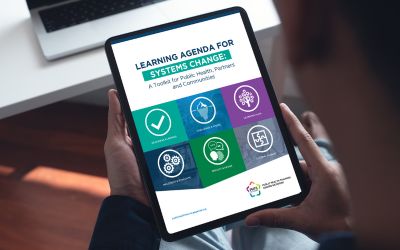Announcements
On the Calendar
Looking for upcoming trainings? In addition to our large collection of on-demand webinars and self-paced courses, please join us for these synchronous learning opportunities:
Region IV PHTC Awarded Funding to Continue Building the Capacity of the Public Health Workforce in the Southeastern U.S.
The Region IV Public Health Training Center (PHTC) has received a $4.4 million award from the Health Resources and Services Administration (HRSA), a U.S. Department of Health and Human Services (HHS) agency. These funds will be used over the next four years to improve the ability of the public health workforce to meet national, state, and local needs under the direction of Principal Investigator Melissa (Moose) Alperin, EdD, MPH, MCHES.
New Podcast: Adaptive Leadership for Public Health
The Region IV Public Health Training Center has launched a podcast series! Adaptive Leadership for Public Health is a six-part series created to help tier 3 (senior management/executive level) public health professionals address complex challenges by growing and thriving as adaptive leaders. We know your time is limited, so these short episodes are designed for you to listen on your commute, over a lunch break, or while taking a walk.
R-IV PHTC Trainings Earn Quality Seal
Six self-paced learning modules produced by the Region IV Public Health Training Center have been accepted as part of the Public Health Learning Navigator. These courses were nominated for inclusion and then assessed by a panel of three peer reviewers using the National Network of Public Health Institutes’ Quality Standards for Training Design and Delivery.
Featured Trainings
The Region IV PHTC offers free competency-based trainings for public health professionals throughout the region and nation.
Bridging the AI Gap: From Pilot Projects to Sustainable AI Governance in Public Health
Uncover the paradox facing public health today: more than 75% of agencies are experimenting with AI tools, yet 85% still lack the governance policies needed to use them responsibly. This session will discuss findings from a landmark survey of 25+ state and local health departments, exploring the critical gap between AI enthusiasm and responsible implementation. Learn how to navigate concerns around data privacy, algorithmic bias, and public trust while harnessing AI’s transformative efficiency. Walk away with a practical readiness checklist to move your organization from experimentation to sustainable AI adoption.
Appreciative Inquiry: Using a Positive Approach to Build Capacity
This course introduces Appreciative Inquiry, a strengths-based, positive, cooperative approach to building capacity. It is an introductory-level course in designing programs and projects using a positive lens, emphasizing that every person and community has inherent strengths, capabilities, and potential, rather than focusing primarily on their needs, problems, or deficits.
Workforce Wellness Recharge: Drivers, Detours, and Destinations: Strength-Based Goal Setting for the Public Health Workforce
Grounded in recovery-informed practice and neuroscience, this webinar introduces a strength-based, brain-informed approach to goal setting that honors burnout, setbacks, and real-world constraints. Participants will explore why traditional goal-setting often fails under stress, how capacity and follow-through are impacted by burnout, and how to create small, sustainable actions that build momentum over time. If you slip, you don’t stop—you recalibrate, reset, and keep moving forward.
Understanding the Uniform: A Campfire Chat on Connecting Military Culture with Public Health
Join us for a Campfire chat focused on understanding the National Guard community and its public health needs. This presentation examines the intersection of National Guard culture and public health, emphasizing the vital role of service members in community health initiatives and emergency response. We will discuss the impact of military training on public health preparedness, the importance of Integrated Primary Prevention, and collaboration with public health agencies during crises. Attendees will gain insights into the cultural values of the National Guard and their implications for enhancing public health outcomes at all levels.
On the Road Across the Lifespan
Join us for an insightful webinar focused on transportation safety across all stages of life. From the earliest years to aging adults, ensuring safety on the road is a shared responsibility that evolves with age and experience. This session will highlight key aspects of transportation safety, providing valuable information and practical strategies for everyone involved in travel, whether as passengers or drivers.
Workforce Wellness Recharge: Navigating the Holiday Stress Spectrum
The holiday season often brings connection and joy—but also pressure, exhaustion, and emotional strain. Workforce Wellness Recharge: Navigating the Holiday Stress Spectrum invites public health professionals to explore how holiday-related stress impacts well-being, relationships, and workplace culture. Participants will learn how to recognize where they fall on the Holiday Stress Spectrum, from healthy activation to harmful overload, and apply practical techniques to restore balance. Through trauma-informed reflection, storytelling, and holistic wellness tools, this interactive session helps participants build awareness, reduce burnout, and approach the holidays with renewed energy and compassion.
Grant Me Strength: Budgeting Basics for Public Health Warriors
Budgeting doesn’t have to be intimidating—it’s a core skill for every public health professional navigating grant-funded programs. This session breaks down the essentials of budgeting and reframes financial management as a strategic tool for program success. Through practical examples and a touch of humor, participants will learn how to build budgets that support sustainability, align with program goals, and tell a compelling story of impact.
Learning Agenda for Systems Change: A Toolkit for Public Health, Partners, and Communities
This one-hour webinar offers a deep dive into the Learning Agenda for Systems Change (LASC) framework. Attendees will gain a comprehensive overview of the framework’s phases and components, and learn how it can be applied to support workforce development planning and systems change efforts.
The Violence Project: How to Stop a Mass Shooting Epidemic
This webinar will bring together professionals working across various areas of injury and violence prevention to explore the epidemiology of mass violence and its connections to other forms of injury. Dr. Jillian Peterson will present data related to perpetrators of mass violence to build a shared understanding of common risk factors for perpetration of mass violence. Attendees will learn practical actions that practitioners, public health professionals, and clinicians can do to decrease an individual’s likelihood of mass violence perpetration.
Communicating Public Health in Plain Language
This webinar on effective public health communication is designed to equip participants with the skills needed to reach diverse audiences across various industries and communities. During this interactive session, participants will discover the critical importance of clear, accessible communication in public health settings and learn practical plain language techniques that can transform complex health information into understandable, actionable messages. Through real-world examples and proven strategies, attendees will gain hands-on experience in tailoring their communication approach for different audiences, ensuring their public health messages resonate with and effectively serve diverse populations.
The Story Behind the Numbers: Understanding the Art of Narrative Construction in Public Health
Discover the power of storytelling as a tool for public health impact. In this interactive session, participants will explore the key elements of compelling stories that resonate with diverse audiences, while learning to navigate ethical and cultural considerations such as consent, dignity, and stigma when integrating local narratives. The webinar will also guide participants in building a mini logic model to connect storytelling efforts to measurable outcomes, equipping them with practical tools to assess impact and strengthen community engagement.
Hosting Future Public Health Leaders: The Why and How of Investing in Students
Have you ever thought about the impact you could make by mentoring a student, even if your organization has not hosted interns before? This session, Hosting Future Public Health Leaders: The Why and How of Investing in Students, will explore why investing in students matters for the future of every profession and how you can create positive, practical learning experiences. You will gain insights on how to set clear expectations, communicate effectively, and support learners while also strengthening your own organization. Whether you work in public health, education, government, or a community-based organization, this webinar will leave you with strategies and inspiration to nurture the next generation of leaders.













